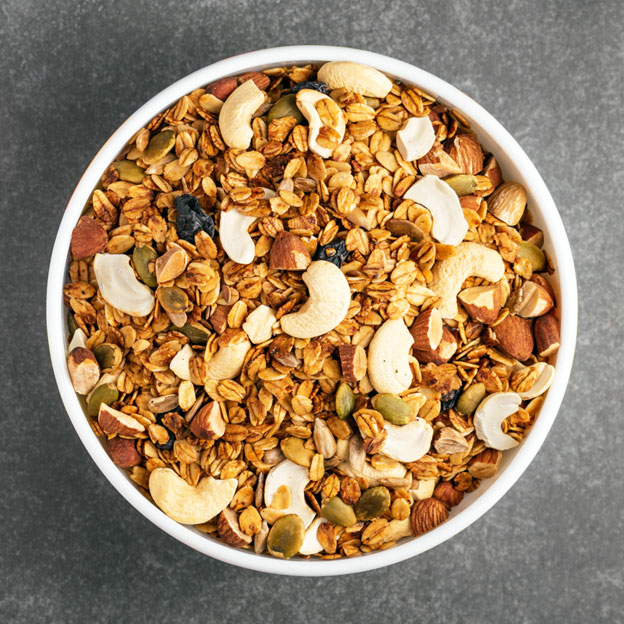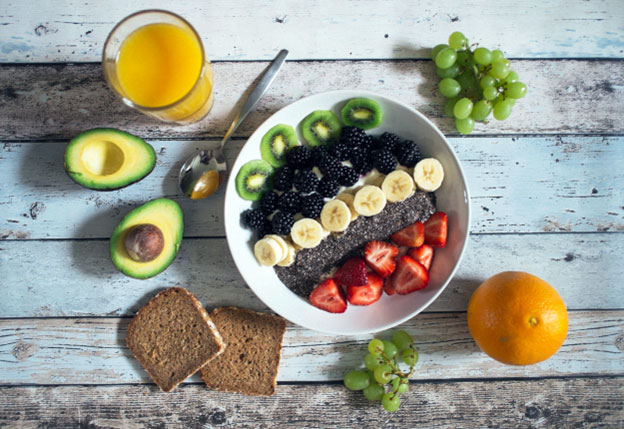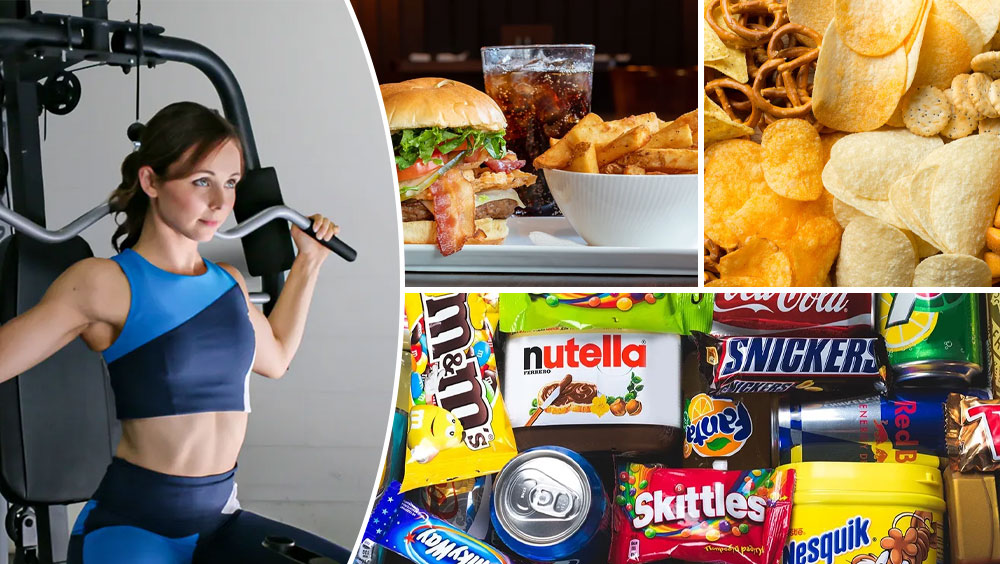Building muscle takes dedication and hard work, but your diet plays a major role in your success. To maximize the results of your workouts, you need to eat the right foods that fuel and nourish your body. However, some foods can actually hinder muscle growth and should be avoided when attempting to build muscle.

Foods That Hinder Muscle Building
Processed Foods and Sugary Snacks
When it comes to building lean muscle mass, it's important to make wise food choices that support muscle growth and recovery. One category of foods to avoid is processed foods. These items are typically high in refined carbohydrates and unhealthy fats while lacking in important nutrients and fiber. Refined flour and white bread, for example, offer little in terms of muscle-building benefits. Instead, opt for complex carbohydrates like whole grains, which provide sustained energy for your workouts and help support muscle recovery.
Another group of foods to steer clear of is sugary snacks. These treats are often loaded with added sugars and empty calories, which can hinder your muscle-building progress. Excess sugar consumption can lead to body fat and an increased risk of heart disease and other health issues. Instead of reaching for sugary drinks or artificial sweeteners, choose fresh fruits as a natural source of sweetness and nutrition.

High-Sodium Foods
High-sodium foods are another category to avoid when building muscle. These foods can lead to water retention and bloating, making it harder to achieve that desired muscle definition. When you consume high amounts of sodium, your body retains water to balance the high concentration of sodium in your bloodstream. This can leave you feeling puffy and bloated, masking your hard-earned muscle gains.
Excess sodium intake can also have negative effects on your overall health. It can increase blood pressure, putting you at a higher risk for heart disease and other cardiovascular issues. Additionally, excessive sodium consumption can impair insulin sensitivity, which can hinder muscle recovery and growth.
Foods High in Trans Fats
Trans fats are a type of unhealthy fat that can have detrimental effects on your overall health. These fats are formed through a process called hydrogenation, which turns liquid oils into solid fats. While trans fats can naturally be found in small amounts in some animal-based foods, the majority of trans fats in our diets come from processed foods.
Consuming foods high in trans fats can increase your risk of developing heart disease. They raise bad cholesterol levels (LDL) and lower good cholesterol levels (HDL), which can lead to the buildup of plaque in your arteries. This, in turn, can increase your risk of heart attacks and strokes.
But the negative effects of trans fats don't stop there. They can also interfere with nutrient absorption in your body. Trans fats act as barriers, preventing the absorption of essential vitamins and minerals. This can lead to nutrient deficiencies and negatively impact your overall health and well-being.
To protect your health, it's important to avoid or minimize your intake of foods high in trans fats and increase healthy fats. These include commercially baked goods like cookies and pastries, fried foods, and processed snacks like chips and crackers. Checking food labels to look for "partially hydrogenated oils" is crucial, as this is an indication of the presence of trans fats.

Foods That Interfere with Nutrient Absorption
Calcium-Rich Foods and Iron Absorption
Calcium-rich foods, while important for bone health, can inhibit the absorption of iron. When consumed together, calcium and iron can compete for absorption in the digestive system. This is especially true when consuming high amounts of calcium, such as from dairy products or calcium supplements.
To balance these nutrients and maximize their absorption, it's important to be mindful of their consumption. Here are some strategies to consider:
Separate calcium and iron-rich foods: Try to consume calcium-rich foods and iron-rich foods separately. For example, have your calcium-rich yogurt or cheese as a snack between meals, rather than with a meal that contains iron-rich sources like spinach or lean meats.
Pair iron-rich foods with vitamin C: Consuming vitamin C-rich foods alongside iron-rich foods can enhance iron absorption. Add fruits like oranges, strawberries, or bell peppers to your meals to increase vitamin C content and aid iron absorption.
Consider iron supplements: If you struggle to meet your iron needs through food alone, talk to your healthcare provider about taking an iron supplement. However, it's important to note that iron supplements should be taken on an empty stomach for better absorption, as calcium can interfere with their effectiveness.
Cook foods in cast iron pans: Cooking foods like meat, vegetables, or grains in cast iron pans can increase their iron content. The iron leaches into the food during cooking, making it easier for your body to absorb.
Excessive Fiber Intake
While fiber offers numerous health benefits, it can interfere with nutrient absorption, especially when consumed in excess. Fiber is known for promoting digestive health, regulating blood sugar levels, and supporting weight management. However, consuming too much fiber can lead to bloating, gas, and may interfere with the absorption of important nutrients needed for muscle growth and recovery.
To manage fiber intake in a muscle-building diet, it's important to strike a balance between its benefits and potential drawbacks. Here are some strategies to consider:
Opt for soluble fiber: Choose foods that contain soluble fiber, which dissolves in water and is gentler in digestion. Good sources include oats, legumes, fruits like apples and berries, and veggies like carrots and broccoli.

Moderate high-fiber foods: Avoid consuming excessive amounts of high-fiber foods in one sitting. Instead, spread them throughout the day to prevent overwhelming your digestive system. Examples of high-fiber foods include whole grains, nuts, seeds, and certain vegetables like Brussels sprouts and kale.
Stay hydrated: Adequate hydration is essential for proper fiber digestion. Water helps soften and move fiber through the digestive tract, preventing discomfort and aiding nutrient absorption. Aim to drink at least 8-10 cups of water per day.
Consider supplements: If meeting your fiber requirements through whole foods is challenging, consider fiber supplements. However, do so under the guidance of a healthcare provider to ensure proper dosage and to avoid potential adverse effects.
Listen to your body: Everyone's tolerance to fiber varies, so pay attention to how your body responds to different foods. If you notice excessive bloating, gas, or discomfort, adjust your fiber intake accordingly.
Foods That Cause Inflammation
Foods High in Omega-6 Fatty Acids
Foods that are high in omega-6 fatty acids may contribute to inflammation in the body when consumed excessively. While omega-6 fatty acids are essential for our health, an imbalance between omega-6 and omega-3 fatty acids can promote inflammation and increase the risk of chronic diseases.
Common sources of omega-6 fatty acids include processed and fried foods, as well as vegetable oils like soybean, canola, and corn oil. These oils are often used in cooking and food processing due to their low cost and long shelf life. However, consuming too much of these oils can lead to an unhealthy omega-6 to omega-3 ratio.
To promote a healthier balance, it's important to opt for foods that are rich in omega-3 fatty acids. Sources of omega-3s include fatty fish like salmon, sardines, and mackerel, as well as chia seeds, walnuts, and flaxseeds. These foods not only provide omega-3 fatty acids but also offer additional health benefits like reducing inflammation and improving heart health.
It's also beneficial to choose cooking oils with a healthier omega-6 to omega-3 ratio, such as olive oil, avocado oil, or coconut oil. These oils are lower in omega-6 fatty acids and contain heart-healthy monounsaturated fats.
Allergenic Foods
Food allergies can trigger inflammation in the body, which can have negative effects on muscle growth and recovery. When someone with a food allergy consumes a triggering food, their immune system responds by releasing chemicals that cause inflammation. This inflammation can result in muscle soreness, joint pain, and decreased muscle recovery.
Common allergenic foods include nuts, shellfish, dairy products, eggs, soy, and wheat. These foods contain proteins that some individuals' immune systems see as a threat. It's important for individuals with food allergies to avoid these trigger foods to prevent inflammation.

Fortunately, there are plenty of alternatives available for those with food allergies. Nut-free alternatives like sunflower seed butter can replace peanut butter, and dairy-free milk alternatives such as almond milk or oat milk can be used instead of cow's milk. Soy-free protein sources like lean meats, fish, and legumes can be incorporated into the diet to ensure an adequate intake of protein for muscle growth and recovery.
It's essential for individuals with food allergies to carefully read food labels and be mindful of cross-contamination when dining out. Choosing whole, unprocessed foods like fresh fruits, vegetables, lean meats, and healthy carbohydrates can help individuals avoid allergenic foods while nourishing their bodies for optimal muscle growth and recovery.
Conclusion: Optimal Nutrition for Muscle Growth
In conclusion, when it comes to building muscle, there are certain foods that should be avoided. These include white bread, artificial sweeteners, deep-fried foods, refined flour, sugary drinks, cream cheese, ice cream, and white pasta. These foods are often high in refined carbohydrates and added sugars, which can lead to weight gain and negatively impact muscle growth.
Instead, it is important to focus on a balanced and nutrient-dense diet to promote muscle growth. This means including lean meats, such as chicken breast and lean ground beef, as well as fish and legumes as sources of protein. Greek yogurt, cottage cheese, and high-quality protein shakes can also be incorporated as protein sources. Complex carbohydrates found in whole grains, fruits, and vegetables are essential for providing the energy needed for workouts and muscle recovery.
It is always recommended to consult with a nutritionist or dietitian for personalized advice. They can help tailor a meal plan that meets individual needs and goals, taking into consideration factors such as dietary preferences, allergies, and specific daily caloric requirements. By following a carefully designed eating plan, individuals can optimize their nutrition for muscle growth and achieve their ideal body weight.


